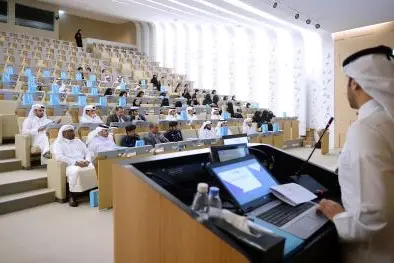PHOTO
Doha: – In their shared ambition to support the continued advancement of human capital in government bodies in line with the National Development Strategy (NDS) 2018-2022, Hamad Bin Khalifa University’s (HBKU) Executive Education Center (EEC) hosted an information session for human resource professionals in close cooperation with the Institute of Public Administration (IPA) at the Ministry of Administrative Development, Labor and Social Affairs. The event, which took place at HBKU’s College of Islamic Studies within Education City, drew a targeted audience of 60 human resource department leaders and training managers serving across various government agencies and ministries in Qatar.
EEC’s training and development programs are supported by its ranks of world-class educators and a progressive vision that complements the country’s national aspirations as outlined in its strategic development plan, Qatar National Vision 2030.
To this end, speaking on the Center’s efforts towards the advancement of Qatar’s continuing education sector, Executive Director of EEC, Rodolphe A. Boughaba said: “Today’s session was designed to showcase how our programs can benefit the ambitions and busy schedule of an active professional, seeking an opportunity for career development within the government sector. As such, the Institute of Public Administration was an invaluable collaborator in this pursuit considering its insight and wide-reaching grasp on labor affairs across all government sectors.
“Additionally, while we aimed to familiarize all participants with existing course offers, we also wanted to receive their valuable feedback to help identify the most relevant areas of training development and aid in shaping future programs to fit the specific requirements of Qatar’s public service sector. As a result, we expect all ministry delegations to reap great benefits from this info-packed event as it will lead to future professional development opportunities that are of immense individual and institutional benefit,” Boughaba concluded before opening the floor to a detailed Q&A session with all participating delegates.
Explaining the pivotal role of training and development in any professional’s career progression, Director of Training at IPA of MADLSA, Abdulaziz Saad Al-Majali, underlined the importance of cooperating with training centers in the country to implement specialized training programs that were not within the Institute's jurisdiction. Such bespoke courses, whose modules were based upon thorough research and relevant experience, he affirmed, would uplift national scales of competitiveness and productivity.
Currently, EEC’s extensive menu of training courses spans across three broad categories. The ‘Leadership Series’ consists of specialized, multi-module courses that delve into topics such as Leadership in Sports Management; Management Best Practices for Corporate Governance; and Transformational Leadership & Innovation. Similarly, the ‘Unique Management Skills’ series introduces executives to topics ranging from Emotional Intelligence to Women and Entrepreneurship through interactive workshops aimed at clasping modern concepts in performance and capability management. Finally, the ‘Specialized Education Courses’ target key academic disciplines that hold grave relevance to current socio-economic trends such as Fundamentals in Cybersecurity; and Food and Natural Resource Sustainability in Qatar.
As part of HBKU, EEC ascribes to the University’s four pillars - Excellence, People, Innovation and Partners – that inspire its synergies with partners ranging from public service departments and ministries to private sector organizations. Focusing on the Center’s mandate to develop human capital within the country, its extensive professional training offerings support executive education across a myriad of Qatar’s industries, including both private as well as government and semi-government entities.
To learn more about EEC’s past and ongoing programs that are relevant to individuals and organizations operating within Qatar’s vibrant economy, please visit www.hbku.edu.qa or email eec@hbku.edu.qa.
-Ends-
About Hamad Bin Khalifa University
Innovating Today, Shaping Tomorrow
Hamad Bin Khalifa University (HBKU), a member of Qatar Foundation for Education, Science, and Community Development (QF), was founded in 2010 as a research-intensive university that acts as a catalyst for transformative change in Qatar and the region while having global impact. Located in Education City, HBKU is committed to building and cultivating human capacity through an enriching academic experience, innovative ecosystem, and unique partnerships. HBKU delivers multidisciplinary undergraduate and graduate programs through its colleges, and provides opportunities for research and scholarship through its institutes and centers. For more information about HBKU, visit www.hbku.edu.qa.
© Press Release 2018Disclaimer: The contents of this press release was provided from an external third party provider. This website is not responsible for, and does not control, such external content. This content is provided on an “as is” and “as available” basis and has not been edited in any way. Neither this website nor our affiliates guarantee the accuracy of or endorse the views or opinions expressed in this press release.
The press release is provided for informational purposes only. The content does not provide tax, legal or investment advice or opinion regarding the suitability, value or profitability of any particular security, portfolio or investment strategy. Neither this website nor our affiliates shall be liable for any errors or inaccuracies in the content, or for any actions taken by you in reliance thereon. You expressly agree that your use of the information within this article is at your sole risk.
To the fullest extent permitted by applicable law, this website, its parent company, its subsidiaries, its affiliates and the respective shareholders, directors, officers, employees, agents, advertisers, content providers and licensors will not be liable (jointly or severally) to you for any direct, indirect, consequential, special, incidental, punitive or exemplary damages, including without limitation, lost profits, lost savings and lost revenues, whether in negligence, tort, contract or any other theory of liability, even if the parties have been advised of the possibility or could have foreseen any such damages.




















